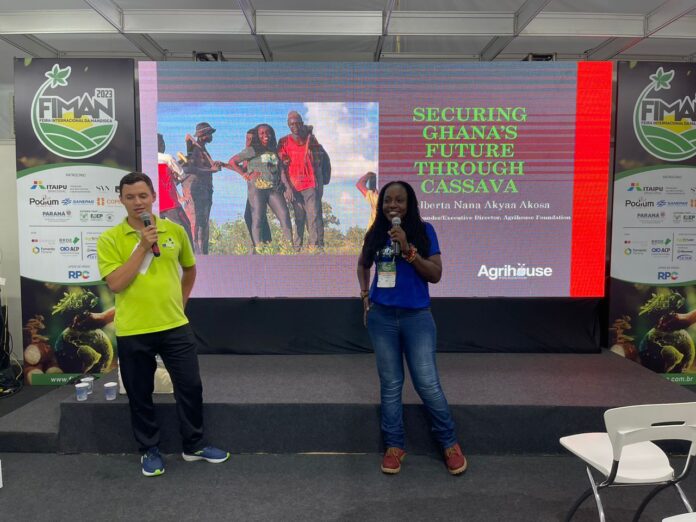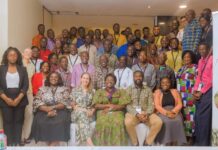In an effort to elevate Ghana’s cassava industry onto the global stage, Alberta Nana Akyaa Akosa, the Executive Director of Agrihouse Foundation, delivered a compelling address to a global audience at the recently concluded International Cassava Fair in Brazil.
Addressing the topic “Securing Ghana’s Future Through Cassava” at the International Cassava Fair in Brazil, Ms. Akosa passionately advocated for a transformative approach to Ghana’s cassava industry, emphasizing the critical need to reshape the narrative around cassava cultivation in the country and the necessity for value addition.
The international cassava fair (FIMAN) 2023, organized by Podium Alimentos, was held from Tuesday, November 21st, to Thursday, November 23rd, 2023, aiming to foster knowledge exchange, networking, and collaborative exploration in the cassava sector. Ms. Akosa highlighted the crucial role of Ghana-Brazil collaboration in propelling advancements within Ghana’s cassava industry to significantly contribute to food security and economic growth in the country.
Ms. Akosa also shed light on the unique opportunities and challenges facing Ghana’s cassava industry, exploring avenues for collaboration with international partners, adoption of best practices, value addition, mechanization, and innovative strategies. The goal is to position Ghana as a major player in the global cassava market.
CELEBRATING CASSAVA: A DEFICIT IN GHANA: Despite its immense potential, Ms. Akosa highlighted the startling reality that Ghana is not celebrating cassava enough. The majority of cassava farming is directed towards domestic consumption, with limited emphasis on value addition. While there are noteworthy industries engaged in starch and alcohol production, the broader cassava sector struggles to secure the attention it deserves, particularly in comparison to the historically dominant cocoa and gold industry. With an annual production of 22 million metric tonnes, the time is ripe for a paradigm shift.
“Despite the abundance of opportunities in our cassava value chain, it remains underrated and under-celebrated. We all know how easy it is to grow cassava here in Ghana. Our country, our youth, our women, and the industry as a whole stand to gain more if we fully explore and embrace the vast potential within the cassava value chain, it is time for Ghana to mine Cassava as it mines Gold. Our country needs more cassava factories, farms, varieties, and equipment, such as planters, harvesters, dryers, and washers’’. ,” stated Ms. Akosa.
CULTIVATING CASSAVA’S HIDDEN RICHES: Ms. Akosa also underscored the need for a paradigm shift in Ghana’s agricultural focus. Cassava, often relegated to subsistence farming, stands on the precipice of a transformative revolution. The abundance of this resilient crop represents an untapped resource that, with the right attention, could blossom into a driving force for economic growth and food security.
With a production capacity that rivals cocoa, the time is ripe for Ghana to seize the opportunity and usher in a new era of cassava appreciation. Ms. Akosa’s call for a paradigm shift extends beyond the agricultural landscape; it beckons a recalibration of societal perceptions, urging Ghanaians to recognize the economic and nutritional potential that cassava holds.
While notable industries engage in starch and alcohol production, there remains immense scope for diversification. The versatility of cassava extends far beyond the traditional, offering a canvas for innovative products and industries. Encouraging value addition not only benefits local farmers but also positions Ghana on the global stage as a key player in the cassava market.
CHALLENGES AND OPPORTUNITIES: NAVIGATING THE CASSAVA LANDSCAPE: The Executive Director outlined the current challenges facing Ghana’s cassava industry. Traditional farming methods, predominantly through the use of cutlasses and hoes, remain prevalent. However, she noted a positive trend with an increasing number of women smallholder farmers contributing to the sector. The existence of 32 cassava varieties developed by research institutions reflects the genetic diversity available for exploration.
Yet, challenges persist. A lack of machinery and equipment for processing, drying, and planting hinders efficiency. The knowledge gap for value addition and the absence of diverse recipes to encourage farmers to explore alternative uses of cassava contribute to the stagnation of the sector.
PROPOSED MEASURES: CATALYZING A CASSAVA REVOLUTION: Ms. Akosa laid out a comprehensive set of proposals to propel the cassava sector forward. This includes the urgent development and availability of domestic and edible seed varieties, the infusion of machinery and equipment at every stage of the production process, and a robust effort to address the knowledge gap hindering value addition. The call for capacity building and know-how to commercialize cassava effectively was underscored, along with increased investment in inputs and technology.
GOVERNMENT INTERVENTION: A significant portion the address was dedicated to advocating for government intervention. A strategic focus on cassava, the establishment of cassava farms, and support for farmers with improved seeds and markets are crucial steps. She urged the exploration of partnerships for industrialization and commercialization, positioning cassava as the next economic powerhouse akin to cocoa and gold. The initiative, she emphasized, would not only create more employment opportunities but also generate much-needed revenue.
LEARNING FROM BRAZIL’S CASSAVA SUCCESS STORY: In highlighting Brazil’s advanced cassava industry, Ms. Akosa provided a blueprint for Ghana’s future. Brazil’s utilization of cassava for starch, ethanol, and the creation of over 1000 food recipes showcase the boundless potential of this crop. The adoption of biogas production from cassava waste further illustrates the versatility that can be harnessed.
“Brazil’s cassava industry is budding and booming with a high level of value addition. This is an area Ghana can adopt to improve the value chains. Our women and beginner agribusinesses stand to gain a lot in terms of job creation by adding value to cassava. Brazil currently has over 1000 cassava food recipes. Ghana’s climate is much similar to Brazil and I am confident, transferring of knowledge and know-how in cassava food nutrition recipes will be an added value.
According to her, the Cassava industry is a huge jackpot in Brazil. Brazilian Agric manufacturers have been able to develop and manufacture equipment, such as cassava dryers, washers, planters, harvesters, etc., that enhance speed and bring about efficiency. This is a big leap for Ghana, should we be able to partner with Brazilian Manufacturers to develop machinery and equipment as these for our sector.
CONCLUSION: A TRANSFORMATIVE VISION FOR GHANA’S CASSAVA FUTURE: Ms. Akosa concluded her address with a powerful call to action. Beyond showcasing Ghana’s cassava sector, the initiative seeks to foster connections and explore sustainable business opportunities within the dynamic global cassava value chain. With the potential for Ghana to emerge as a key player in the international cassava market, the time is ripe for a Cassava Revolution—a transformative vision to secure Ghana’s agricultural future.
‘’ As we celebrate our agricultural diversity, let us not overlook the golden potential that cassava holds in propelling our nation towards a more sustainable and prosperous future. It is my desire to see Ghana mining Cassava in the next three to five years. Partnering with Brazilian Cassava players is one sure step to get there. We need the exchange of ideas, transfer of knowledge, and all that is needed to grow the sector.’’ She concluded








